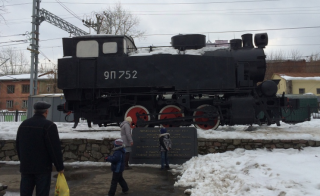The Great Exodus: Ukraine's Refugees Flee to Russia
Perm may not be on the radar of most Westerners, but it has become a major hub for Ukrainians seeking a safe haven in Russia.
Labor Market
In addition to the low pay, there is also a disparity in the type of jobs sought and those available. Although the Perm Employment Bureau assists refugees in getting jobs, of which there were 40,000 vacancies in Perm krai mid-2014, finding the right match is often a difficult task. Most of the refugees arriving in Perm from Ukraine used to work as miners, vendors, welders, accountants, house painters, and kindergarten teachers, while Perm is more in need of doctors, teachers, veterinarians, tailors, and builders. Some are willing to take jobs differing from their previous experience, but they are often dissatisfied with the pay.
Furthermore, gaining official employment in Russia can be a tedious, bureaucratic process even for Russian citizens. It typically requires submitting a host of documents including educational diplomas, professional certificates, and official copies of one’s employment record. As most refugees fled their homes in an anxious rush, they often only have the most critical documents, such as their passports, with them. This can also become a barrier, or at least a delay, for official employment.
Social Benefits
Refugee status in Russia, as in many countries, allows the recipient various social benefits, including unemployment compensation. In August 2014, Duma Parliamentarian Roman Hudyakov of the Liberal Democractic Party of Russia (LDPR) proposed a bill that would reduce benefits to refugees. If passed, the amendment would discontinue benefits to refugees if he/she turns down three job offers from the employment bureau. This would hold refugees to more or less the same standards as Russian citizens, as unemployed Russians stop receiving social benefits if they turn down two job offers from employment services. The bill is still being reviewed by the Duma, and it will be interesting to see what is decided and when.
In addition to the uncertainty surrounding unemployment benefits, refugees of retirement age face another serious problem. Igor Morozov, mentioned above, worked for 21 years as a miner in Ukraine. Russian miners typically have to work 20-25 years before qualifying for a pension, depending on their specific work in the mines. When Morozov visited the office of the Russian Pension Fund in Okhansk to inquire about the possibility of receiving a pension he was told he needed to work an additional 11 years as a miner before he would qualify. This is just one example of the many complicated situations that refugees face. In some cases, their status allows them the support they need to get on their feet, but in others, the inconsistencies and vagueness of the Russian government’s policies puts them in an even more disadvantaged position.
Finally, the most significant blow to refugees’ benefits came recently when the FMS announced in January 2015 that it will revoke the exemption from certain regulations Ukrainian refugees were allowed in 2014 and, instead, use the same general restrictions that apply to migrants from other visa-free countries. In short, this means that Ukrainian refugees can only reside in Russia without specific documents (work permit, temporary residence permit, among others) for 90 of every 180 days. Furthermore, those Ukrainian refugees who want to be legally employed or apply for permanent residence will be required to pass an exam in Russian history, culture, and law — one more hoop to jump through, and one more fee, as the exam costs 3,000 rubles. Predictably, the only exception to these new regulations will be for Ukrainian refugees from the Donbass, who are “running from war and hunger and need Russia's help."
Temporary to Permanent?
As we enter the coldest months of the winter, it is unlikely that there will be as much movement of refugees. Ukrainian refugees are adjusting to their new lives in cities and regions like Perm, with varying levels of support and success. With the latest FMS decision, we can expect less and less assistance for the refugees. If that were not bad enough, the imminent recession that is forecasted to hit Russia this year will make things even more difficult, and likely increase tension with the locals who will be competing for the same jobs. The signal from the FMS is clear — as of 2015, the Ukrainians fleeing the war will no longer be seen or treated as refugees but as migrants, of whom there were already close to three million Ukrainians in Russia before the conflict began. In some ways, this distinction might be subtle, as both groups face many obstacles in Russia. Migrants in Russia are largely viewed as “guests,” and there is a lack of infrastructure to integrate new arrivals and encourage them to stay. Yet many of the migrants do stay, tied to jobs that leave little room for upward mobility. Barring any extraordinary social and economic changes in Russia in the near future, it seems likely that the same phenomenon will happen with the Ukrainian refugees, as the temporary becomes permanent.
Mary Elizabeth Malinkin is an associate of the Kennan Institute at the Wilson Center, focusing on migration issues and interethnic relations in Eurasia; Liliya Nigmatullina is an independent scholar and former research assistant at the Kennan Institute. The opinions expressed in this article are those solely of the authors.
Photo by Mary Elizabeth Malinkin

